Related Research Articles

Martin Ludwig Bormann was a German Nazi Party official and head of the Nazi Party Chancellery. He gained immense power by using his position as Adolf Hitler's private secretary to control the flow of information and access to Hitler. He used his position to create an extensive bureaucracy and involve himself as much as possible in the decision making.

The Berghof was Adolf Hitler's vacation home in the Obersalzberg of the Bavarian Alps near Berchtesgaden, Bavaria, Germany. Other than the Wolfsschanze, his headquarters in East Prussia for the invasion of the Soviet Union, he spent more time here than anywhere else during his time as the Führer of Nazi Germany. It was also one of the most widely known of his headquarters, which were located throughout Europe.

Adolf Hitler, chancellor and dictator of Germany from 1933 to 1945, committed suicide via gunshot on 30 April 1945 in the Führerbunker in Berlin after it became clear that Germany would lose the Battle of Berlin, which led to the end of World War II in Europe. Eva Braun, his wife of one day, also committed suicide, taking cyanide. In accordance with Hitler's prior written and verbal instructions, that afternoon their remains were carried up the stairs and through the bunker's emergency exit to the Reich Chancellery garden, where they were doused in petrol and burned. The news of Hitler's death was announced on German radio the next day, 1 May.

Blondi was Adolf Hitler's German Shepherd, a gift as a puppy from Martin Bormann in 1941. Hitler kept Blondi even after his move into the Führerbunker located underneath the garden of the Reich Chancellery on 16 January 1945.
Oskar Kuhn was a German palaeontologist.
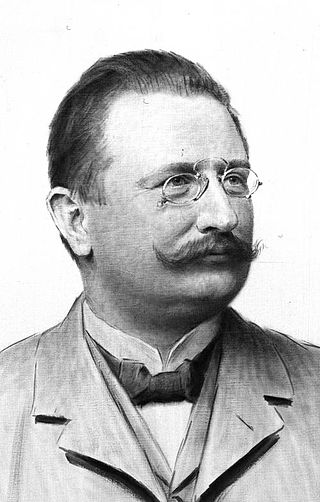
Otto Ferdinand Georg Kern was a German classical philologist, archaeologist and epigraphist. He specialized in the field of ancient Greek religion, being known for his investigations of Greek mystery cults and Orphism, as well as the ancient city of Magnesia on the Maeander and later also the history of ancient studies. In 1907 he became professor at the University of Halle-Wittenberg, where he became rector in 1915/16.
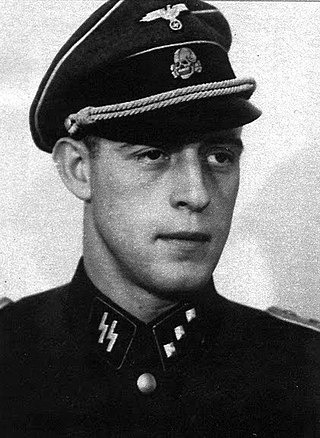
Otto Günsche was a mid-ranking officer in the Waffen-SS of Nazi Germany during World War II. He was a member of the SS Division Leibstandarte before he became Adolf Hitler's personal adjutant. Günsche was taken prisoner by soldiers of the Red Army in Berlin on 2 May 1945. After being held in various prisons and labour camps in the Soviet Union, he was released from Bautzen Penitentiary on 2 May 1956.

Wilhelm Brückner was Adolf Hitler's chief adjutant until October 1940. Thereafter, Brückner joined the Heer (army), becoming an Oberst (colonel) by war's end. He died on 18 August 1954 in then West Germany.
Wilhelm Zander was an adjutant to Martin Bormann during World War II. He died in Munich in 1974.

Günther Korten was a German Colonel General and Chief of the General Staff of the Luftwaffe in World War II. He died from injuries suffered in the assassination attempt on Adolf Hitler on 20 July 1944.
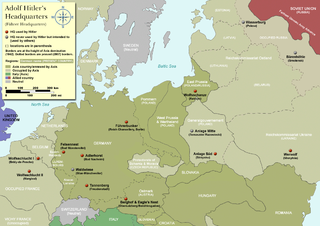
The Führer Headquarters, abbreviated FHQ, were a number of official headquarters used by the Nazi leader Adolf Hitler and various other German commanders and officials throughout Europe during the Second World War. The last one used, the Führerbunker in Berlin, where Hitler committed suicide on 30 April 1945, is the most widely known headquarter. Other notable headquarters are the Wolfsschanze in East Prussia, where Claus von Stauffenberg in league with other conspirators attempted to assassinate Hitler on 20 July 1944, and Hitler's private home, the Berghof, at Obersalzberg near Berchtesgaden, where he frequently met with prominent foreign and domestic officials.

Hugo Johannes Blaschke was a German dental surgeon notable for being Adolf Hitler's personal dentist from 1933 to April 1945 and for being the chief dentist on the staff of Reichsführer-SS Heinrich Himmler.
Fritz Tornow was a Feldwebel in the German Army who served as Adolf Hitler's personal dog-handler. He was one of the last people to occupy the Führerbunker when the underground complex was captured by Soviet Red Army troops.
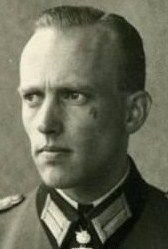
Willy Johannmeyer was a German officer during World War II who served from 1939 to 1945. He was also a recipient of the Knight's Cross of the Iron Cross with Oak Leaves, and at the time of the dissolution of Nazi Germany, the last adjutant to Adolf Hitler of the army (Heeresadjutant).
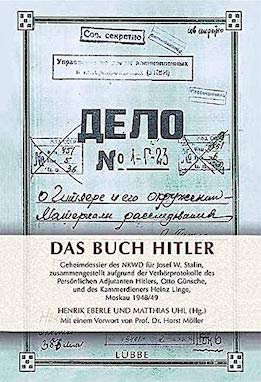
The Hitler Book: The Secret Dossier Prepared for Stalin is the 2005 publication of a long-secret Soviet report on the life of Adolf Hitler written at the behest of Joseph Stalin. It was edited and translated into German by Matthias Uhl and Henrik Eberle.
Werner Maser was a German historian, journalist and professor at the Martin Luther University of Halle-Wittenberg. Maser was the first historian to claim that the Hitler Diaries were forgeries.
Richard Fester was a German historian.

The Berchtesgaden Chancellery Branch office in Bischofswiesener district Stanggaß was built between 1937 and 1945 after plans by Alois Degano as the second seat of government of the Nazi German Empire for the time of Adolf Hitler's presence on nearby Obersalzberg.
Walther Hermann Vetter was a German musicologist. From 1946 to 1958, he was professor at the Humboldt University of Berlin.
Konstanze Musketa is a German musicologist and head of the Library of the Handel House Foundation.
References
- ↑ "Eberle, Henrik publications". Deutsche Nationalbibliothek, Frankfurt am Main. Retrieved 14 January 2016.
- 1 2 3 Christoph Gunkel (4 February 2010). "Medicating a Madman: A Sober Look at Hitler's Health". Der Spiegel (online). Retrieved 14 January 2010.
- ↑ "Dr. Henrik Eberle - Lehrstuhl für Zeitgeschichte: Kurzbiographie". Martin-Luther-Universität Halle-Wittenberg, Halle. Archived from the original on 29 October 2018. Retrieved 14 January 2016.
- ↑ Henrik Eberle (2002). Die Martin-Luther-Universität in der Zeit des Nationalsozialismus. Mitteldeutscher Verlag, Halle. ISBN 978-3-89812-150-7.
- ↑ Henrik Eberle (2000). Anmerkungen zu Honecker. Schwarzkopf & Schwarzkopf. ISBN 978-3-89602-318-6.
- 1 2 Thomas Franke (15 January 2001). "Henrik Eberle: Anmerkungen zu Honecker (review)". Deutschlandradio, Köln. Retrieved 14 January 2016.
- ↑ "Dr. Matthias Uhl: Wissenschaftlicher Mitarbeiter". Deutsches Historisches Institut Moskau. Retrieved 14 January 2016.
- ↑ Henrik Eberle. Bastei Lübbe AG, Köln. Retrieved 14 January 2016.
- ↑ van Soest, Arnoud (interviewer); Eberle, Henrik; Uhl, Matthias (26 November 2005). "'Hitler wist meer van gaskamers dan men denkt' - Een interview met de historici Henrik Eberle en Matthias Uhl (interview transcription)" (in Dutch). 8WEEKLY Webmagazine, Utrecht. Retrieved 14 January 2016.
{{cite web}}:|first1=has generic name (help) - ↑ "Briefe an Hitler. Ein Volk schreibt seinem Führer. Unbekannte Dokumente aus Moskauer Archiven (Letters to Hitler: A People Writes To Its Führer)". New Books in German - A selection from Austria, Germany and Switzerland. Charlotte Ryland i.A. Goethe-Institut, London. Archived from the original on 2016-03-04. Retrieved 2016-01-14.
- ↑ Henrik Eberle (16 October 2007). Briefe an Hitler: Ein Volk schreibt seinem Führer. Unbekannte Dokumente aus Moskauer Archiven - zum ersten Mal veröffentlicht. Bastei Lübbe AG, Köln. ISBN 978-3-78572-310-4.
- ↑ Sven Felix Kellerhoff (2 December 2009). "Hitler war nicht geisteskrank – medizinisch gesehen: Er litt an vielen Dingen: Das Buch "War Hitler krank?" versucht, einen "abschließenden Befund" über die Krankheiten des Diktators zu geben". Die Welt . Retrieved 14 January 2016.